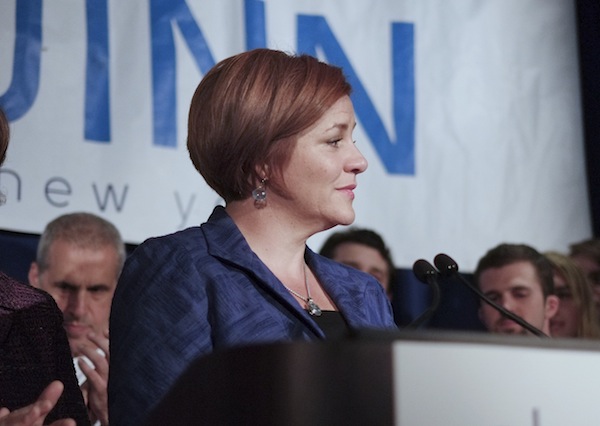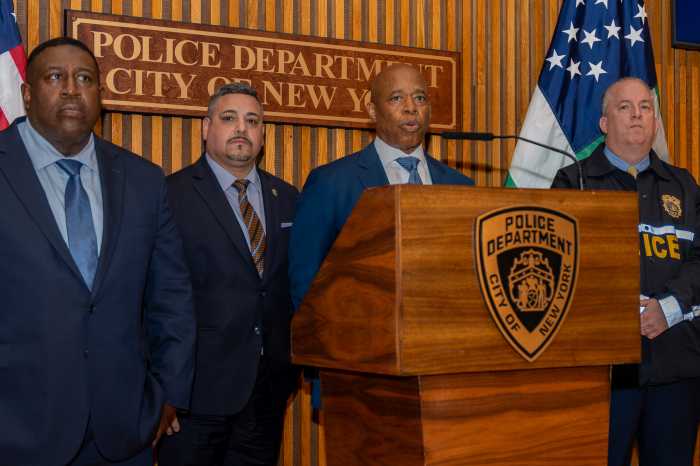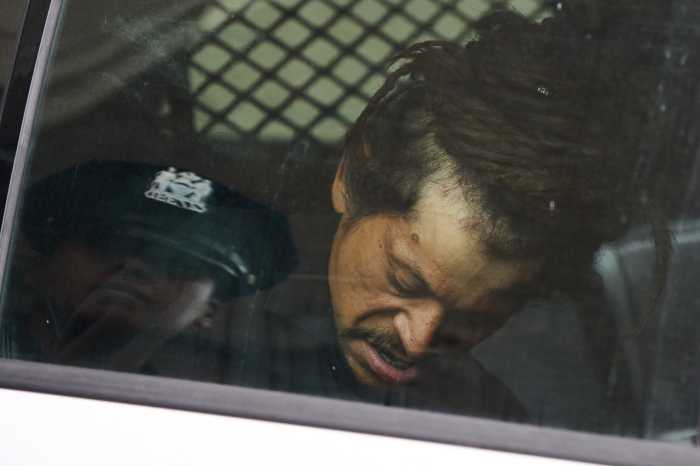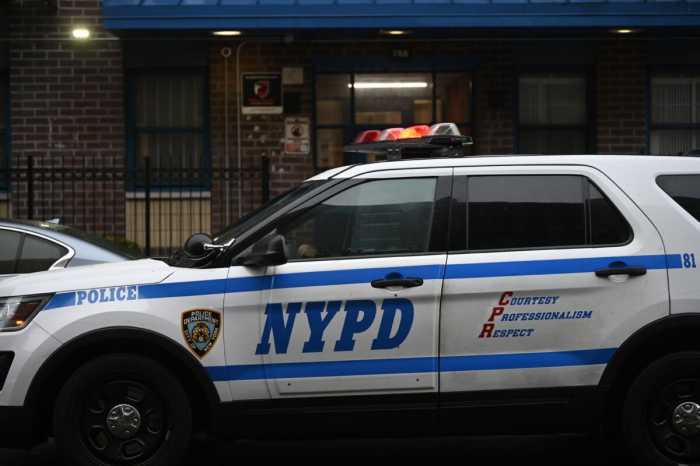
BY LINCOLN ANDERSON | Christine Quinn’s dream of becoming mayor ended at the Dream Hotel in Chelsea on Tuesday night. About an hour and a half after the polls closed — and after President Obama’s speech on Syria was shown live on the flat-screens arrayed around the room — early results of the Democratic primary election began to display on the TV’s.
Within an hour, Quinn would take the stage to congratulate “Bill Thompson and Bill de Blasio on their victories,” in that order, though she remained upbeat in defeat.
Once the prohibitive favorite, the local candidate, who has represented the Village and Chelsea in the City Council since 1999 — and been the Council’s speaker since 2006 — finished a disappointing third, taking 16 percent of the citywide vote. de Blasio romped with 40 percent and Thompson got 26 percent, and it could be a week before it’s known if there will be a runoff between the two in three weeks.
Finally, around 11:15 p.m., Larry Quinn, her 87-year-old father, walking with a cane, led the way up onto the stage to chants of “Mis-ter Quinn! Mis-ter Quinn!” from the candidate’s supporters. Following him up were Christine Quinn’s wife, Kim Catullo, and Quinn’s sister, Ellen, and her husband and Catullo’s relatives. With her family and in-laws arrayed around her, Quinn took the podium.
“In with Quinn!” “In with Quinn!” the crowd chanted for one last time.
Quinn thanked her volunteers for their hard work and thanked all the elected officials and unions who supported her.
After congratulating de Blasio and Thompson, she said, “We all share the common goal — greater opportunities for New Yorkers in every neighborhood.”
She started to say she was disappointed at the election results as a way to segue into positives to be taken away from the experience, but her supporters started shouting out encouragements.
“You’re not done! You’re not done!” they chanted.
“Governor!” someone yelled out.
Quinn said her candidacy has inspired young girls to envision running for higher office and to say to themselves, “I can do this.” Similarly, she said, L.G.B.T. youth can take strength from her campaign effort and realize, “They’re not alone.”
At the end of her remarks, she embraced Catullo in an emotional hug, then kissed her on the cheek.
As the crowd was filing out of the room, former Manhattan Borough President Ruth Messinger told The Villager, “This one I’m very sad about; Gale Brewer I’m very happy about.”
Brewer — who has a deep track record as a progressive, and got her start years ago as Messinger’s chief of staff — won the B.P. primary with 40 percent of the vote. Julie Menin, former chairperson of Lower Manhattan’s Community Board 1, despite a well-financed campaign and a barrage of glossy mailings, finished fourth with 17 percent. Jessica Lappin took 24 percent and Robert Jackson 19 percent.
Also in the crowd was Melissa Sklarz, a transgender woman who is president of Stonewall Democratic Club and a former member of Community Board 2.
“We did all we could,” she said of the Quinn effort. “I think she would have been a great mayor — I like tough Democrats.”
Joe Clementi and his son James were also at the Dream Hotel to show their support for Quinn’s historic bid to be the city’s first openly gay mayor. The father and brother of Tyler Clementi — the Rutgers student who leaped from the George Washington Bridge three years ago after his roommate spied on him and a lover with a webcam — they said Quinn’s candidacy offered a message of hope.
“We support her as a friend,” said James Clementi, 27, who like Tyler, is gay. “And the message that electing her would send to young people and L.G.B.T. people of hope, and letting them know they can aspire to the highest ranks of society, and they can achieve all their dreams because there are no glass ceilings.”
Leaving the Dream Hotel, George Cominskie, president of the Westbeth Artists Residents Council, a big Quinn booster, took a shot at de Blasio.
“I’m very disappointed. Do nothing and promise everything and get elected,” he said of the public advocate, who has a far thinner record of getting things done in government than Quinn.
“I know what it’s like when you’re in a position of authority,” he said. “It’s not easy.”
As his partner, John Turner, gave him a hug, Cominskie said they had hoped a Mayor Quinn would marry them, but that they’ll still probably ask her to do the honors.
Right before Quinn gave her concession speech, The Villager received a text message: “I won.”
It was Arthur Schwartz, the Village’s Democratic state committeeman, who on Tuesday unseated Jon Geballe to reclaim the party post of district leader, which like state committee is unpaid.
Schwartz got 49 percent of the vote, Geballe 36 percent and Deley Gazinelli 15 percent.
Geballe had won the post in a County Committee election in February, filling the spot left vacant when Brad Hoylman resigned after winning election to the state Senate, filling the seat of Tom Duane, last September. Geballe was backed by the Village Independent Democrats club and had the support of local elected officials. But Schwartz had a long track record of community activism, strong advertising, and a late endorsement by de Blasio.
Schwartz hailed Quinn’s loss — and his own victory — as a watershed moment.
“This is really one of the major turning points in the Village,” Schwartz told The Villager the day after his victory, “because the Duane / Quinn period that started in 1991 when Duane was first elected is over. The Village Independent Democrats — by my beating their candidate — it marks a real low point in their existence.
“It’s a new era without Quinn and Duane on the scene. Quinn was basically the boss for the last 10 years,” Schwartz added. “And having a new borough president, Gale Brewer, who’s very progressive and proactive [also changes the political landscape],” he added.
Of course, Schwartz has an ax to grind with Quinn and Duane, who in 2005 told Schwartz to “step aside” and vacate the district leadership so that Hoylman could have it, helping set Hoylman up for what was then expected to be a City Council run for Quinn’s seat this year.
Feeling his oats on Wednesday, Schwartz said of his longtime political sparring partner, Assemblymember Deborah Glick, “And maybe it’s time for Deborah Glick to retire. She’s been in there 23 years. She endorsed Quinn, she endorsed Menin, she made a big deal about Geballe.”
As for how he’ll now work with the district’s female leader, Keen Berger — who badly wanted Geballe to win — Schwartz said, “It’s time for Keen to go, too. In two years, she’ll have 12 years [as district leader] and she should call it a day.”
In that case, Schwartz was asked, maybe Berger should just step down right now?
“Oh, she should leave now, as far as I’m concerned,” he agreed. “She has good work to do on [the new school at] 75 Morton St. I don’t know if she has to be the district leader to do it.”
Berger told The Villager, “I already e-mailed congratulations to Arthur this morning, and I look forward to working with him. We have not figured out exactly how we are going to work together. I’m happy to be the district leader of the Village, and I’m sure I can work with him.”
Calls to Glick and Tony Hoffman, president of V.I.D., were not returned by press time.
Schwartz said he checked the polls around the Village on Election Day and de Blasio won more than 50 percent everywhere. Also, Gale Brewer was the overwhelming favorite for borough president in the Village, he said. No one voted for Liu he said, even though Liu had emerged as the early “anti-Quinn” for the local Democratic political clubs.
For one of the reasons why Quinn didn’t resonate better in her own district, one need have looked no farther than voters exiting the polling sites on the New York University superblocks in the South Village, where the N.Y.U. 2031 mega-development plan to add 2 million square feet of new construction was approved by the City Council last year.
Heléne Denton, a retired accountant who lives on Mercer St., said, “I voted for Bill Thompson. I voted against Chris Quinn. I voted against [Councilmember] Margaret Chin, because they sold us out to N.Y.U. and they let St. Vincent’s close. They didn’t fight. They all backed the real estate people. Now that they need the Village, they want our votes — but they weren’t there when the Village people needed help.
“If Quinn gets in, I will support Lhota,” she declared.
CUNY professor Rosalyn Baxandall, 74, who lives on one of the university’s superblocks, said, “I mainly voted against: People who betrayed us on N.Y.U. and the expansion into the Village. I voted for Jenifer R-A-J-kumar,” she said, having to spell out Chin’s opponent’s name a bit before she could pronounce it. “And I voted for Bill de Blasio for mayor because I thought he’d be best for the schools, and he seems to have more of a campaign for the 99 percent — at least he says.
“Even though I’m a feminist and support gay rights,” she said, “I couldn’t vote for Quinn.”
Later on, outside P.S. 3 on Hudson St., as the polls were getting ready to close, one woman, a retired jewelry maker originally from Ecuador, said she wished she could have voted for Anthony Weiner for mayor.
“You know, he was my favorite — the congressman,” she said. “Let me tell you, he is very, very smart. But he do this stupid thing! Where is his brain? What this garbage? It’s crazy. Such this brain — for nothing!”
No City Council speaker has ever been elected mayor. Before Quinn, Gifford Miller and Peter Vallone, Sr. both went down to defeat in the Democratic mayoral primary.
What comes next for Quinn wasn’t immediately known. However, at one point, she seemed to stress the word “labor” very distinctly when she was thanking her supporters.
In the end, Schwartz said, agreeing with many other pundits, that Quinn was “too identified with Bloomberg. We live in one of the wealthiest communities in the city — but liberal wealthy,” he said of the Village. “And people wanted to see a change. And she was not going to be the change. de Blasio got himself arrested, he went to court, he got two hospitals from closing.”




























